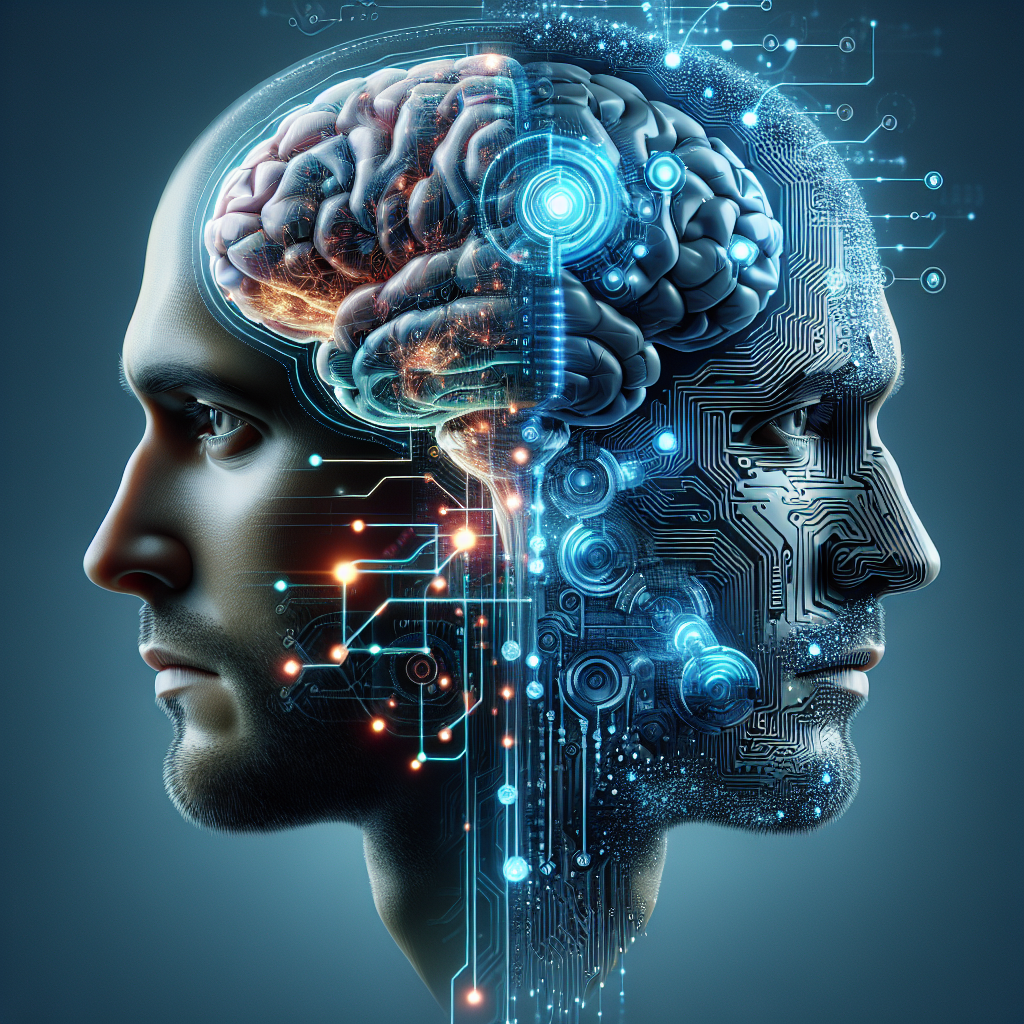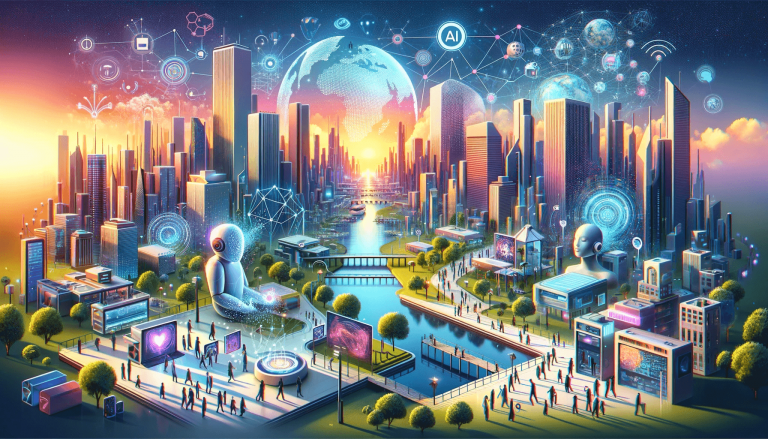Welcome to the world where artificial intelligence (AI) and philosophy meet. The topic of this article – “AI and Philosophy: How AI Challenges Our Understanding of Consciousness, Intelligence and Morality” – raises exciting questions and provides you with profound insights. Without further ado, you will be introduced to the complex world of AI and its philosophical implications. It shows how far-reaching the impact of AI is not only on our technological landscapes, but also on our human understanding, intelligence and moral judgment. You will gain valuable insights and knowledge that are both based on real experiences and scientifically sound. This article will allow you to get a comprehensive picture of the current status and future possibilities of AI.

Contents
ToggleWhat is Artificial Intelligence?
Definition of artificial intelligence
Artificial intelligence (AI) is a branch of computer science that deals with the creation and application of machines and software that can simulate independent thinking and learning. This is intended to replicate human thinking skills and successfully carry out automation and decision-making.
Different types of artificial intelligence
A distinction is often made between weak AI, which is specialized in specific tasks, and strong AI, which has human-like intelligence in many or even all aspects. Examples of weak artificial intelligence include speech recognition software and chatbots, while strong AI could simulate the human mind in profound ways.
Development of artificial intelligence
The development of artificial intelligence has progressed steadily since the middle of the 20th century. From the early days of automation to modern AI technologies such as machine learning and deep learning, the field is constantly evolving, constantly presenting new opportunities and challenges.
What is philosophy?
Definition of philosophy
Philosophy is a science that deals with fundamental questions of life, knowledge and existence. Among other things, she deals with topics such as ethics, logic, metaphysics and epistemology.
Areas of philosophy relevant to AI
On the one hand, the philosophy of mind is relevant, as it also deals with questions of consciousness and identity - points that are becoming increasingly important in artificial intelligence. On the other hand, ethics in AI is a particularly central area, as AI systems are increasingly assuming more responsibility for decision-making.
Consciousness and Artificial Intelligence
Definition of consciousness
In this context, consciousness refers to the awareness of oneself and the environment, the ability to sense, think and feel.
The possibility of artificial consciousness
As technology advances, more and more thought is being given to the possibility of artificial consciousness. Such a scenario raises fundamental questions about the nature of consciousness and the human self.
The effects of an artificial consciousness
An artificial consciousness could have both revolutionary and frightening implications. In terms of artificial empathy, self-knowledge and agency of an AI, this would mean that they could become moral agents.
Intelligence and artificial intelligence
Definition of intelligence
Intelligence is a complex concept that is often equated with the ability to process information, learn from experience, adapt to new situations, and solve problems.
The impact of artificial intelligence on our understanding of intelligence
Artificial intelligence challenges our traditional understanding of intelligence by showing that many intellectual tasks can be successfully performed by machines.
The limits of artificial intelligence in relation to human intelligence
Despite dynamic progress in the field of artificial intelligence, human abilities such as creativity, emotionality and intuition have so far been largely impossible to imitate by machines.
Morality and artificial intelligence
Definition of morality
Morality refers to the principles or rules of proper behavior accepted by individuals or a society.
The impact of artificial intelligence on our morals
Artificial intelligence raises many moral questions through its ability to make decisions and act increasingly autonomously. This development presents new challenges to our moral norms and value systems.
The moral dilemmas created by artificial intelligence
Possible moral dilemmas that could arise from artificial intelligence include questions such as: Who is responsible if an AI makes a mistake? Should an AI have the same rights as a human? How do we deal with privacy and surveillance issues created by AI?
The ethical challenges of artificial intelligence
The areas of ethics affected by artificial intelligence
Artificial intelligence touches on many areas of ethics, including questions of responsibility, privacy, transparency and fairness. As such, it calls on us to develop new ethical standards and guidelines.
Examples of ethical challenges related to artificial intelligence
A prominent example is the question of responsibility for AI-controlled vehicles and their decisions in potential accident situations. Another example is the profound impact that AI-driven algorithms can have on the information available on social media and news platforms.
Possible solutions to these ethical challenges
Possible solutions could include creating new laws and regulations, improving the transparency and explainability of AI systems, or developing ethically based guidelines for AI developers.
Artificial intelligence and the philosophy of humanity
How artificial intelligence challenges our understanding of what it means to be human
Artificial intelligence raises important questions about the nature of humanity. If machines are capable of human-like intelligence functions, what does that mean for our understanding of “humanity”?
The question of the singularity in artificial intelligence
The singularity in artificial intelligence is the theoretical point at which AI systems surpass human intelligence, making it impossible to control or predict the further course of technology. This idea raises many philosophical and ethical questions.
The role of humans in a world with advanced artificial intelligence
The role of humans in a world shaped by AI is increasingly coming into focus. Possible scenarios range from the superfluousness of human labor to the idealized idea of a world in which all unpleasant tasks are outsourced to machines.
The impact of artificial intelligence on society
The social changes caused by artificial intelligence
Artificial intelligence has the potential to bring about profound changes in our society - from the automation of work, to changes in communication and information sharing, to issues of data protection and privacy.
The impact of artificial intelligence on the economy
In business, AI has the potential to fundamentally change labor markets, create new business models and disrupt traditional value chains.
The opportunities and challenges that artificial intelligence offers society
Artificial intelligence offers great opportunities, but also poses risks. These range from questions of justice and inclusion, to the possible effects on the world of work and the economy, to aspects of security and control.
The future of artificial intelligence from a philosophical perspective
The possible scenarios for the development of artificial intelligence
In addition to the dystopian vision of a future dominated by machines, there is also a utopian vision in which AI is used to improve human life, for example through medical deep learning, resource management and much more.
The philosophical questions raised by advanced artificial intelligence
With advanced artificial intelligence, philosophical questions also arise, such as: Will we one day have an AI that is self-aware? Would she then have the same rights as humans?
FAQs
How does artificial intelligence influence our philosophical understanding of intelligence?
Artificial intelligence challenges our traditional understanding of intelligence by showing that machines can take on tasks that were previously considered uniquely human capabilities. This raises questions about the definition and boundaries of intelligence.
What ethical challenges does artificial intelligence bring with it?
AI raises ethical questions regarding responsibility, data protection, transparency and fairness. Examples include responsibility in AI-controlled vehicles and the influence of AI algorithms on social media.
Can artificial intelligence develop consciousness and what philosophical implications would that have?
The possibility of artificial consciousness raises fundamental questions about the nature of consciousness and human identity. This concerns topics such as self-awareness, empathy and moral responsibility.
How is artificial intelligence changing our idea of what it means to be human?
If machines perform human-like intelligence functions, this could change our understanding of “humanity”. It raises questions about the demarcation between humans and machines and about the uniqueness of human characteristics.
What role does philosophy play in the development and regulation of artificial intelligence?
The philosophy contributes significantly to the discussion about ethical guidelines and moral responsibility in the development and application of AI. It helps to understand and shape the effects of AI on society and the individual.



